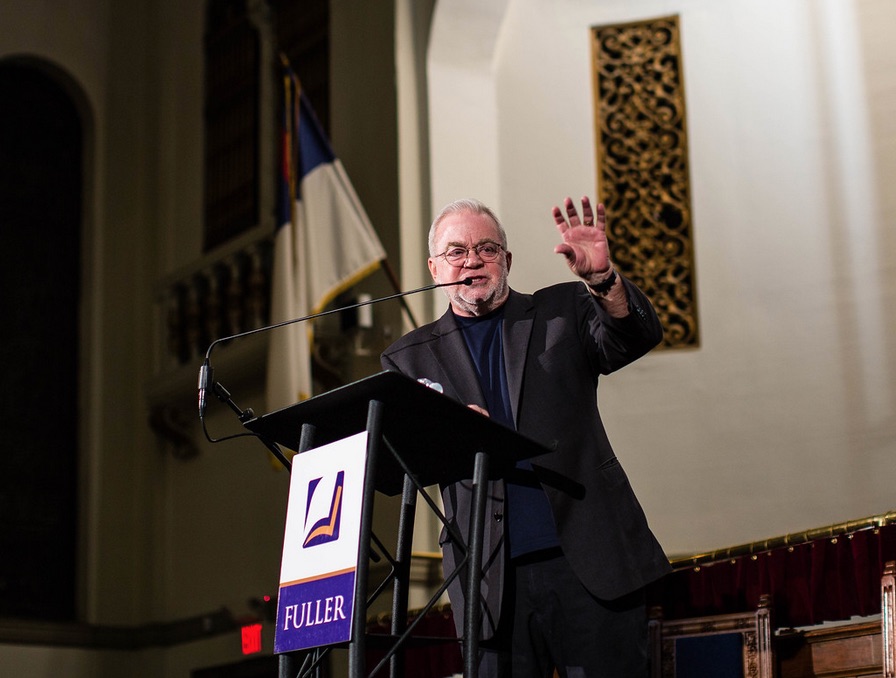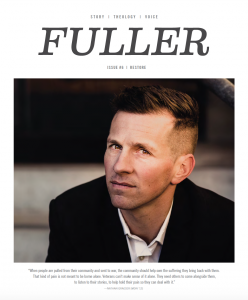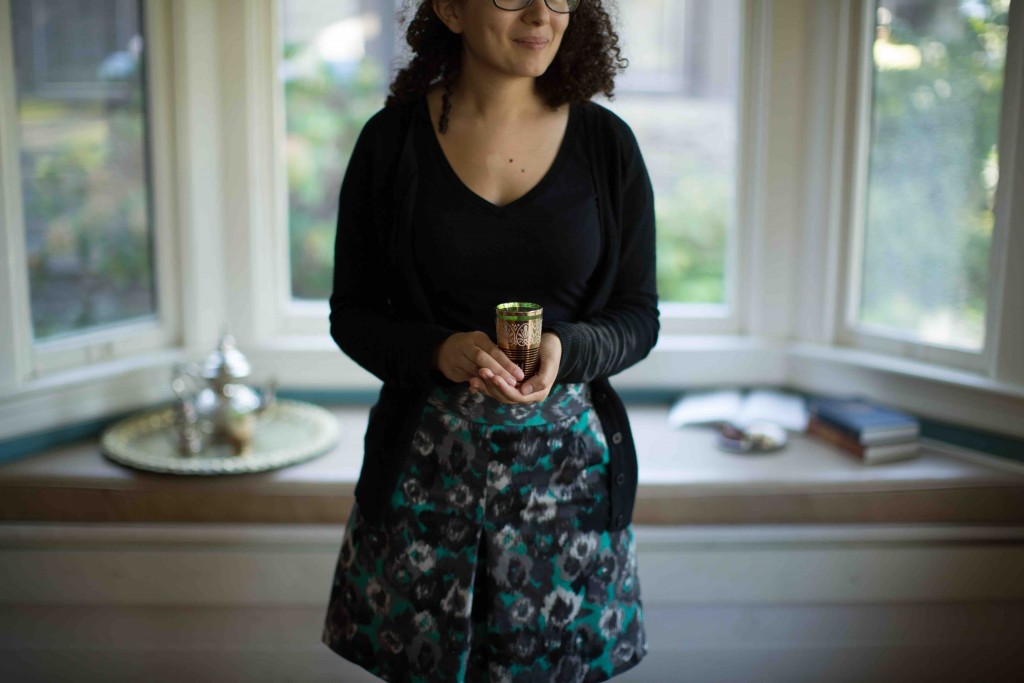
“We must see every person as someone who lives each moment in relationship with God. We need to see the religious connection if we want to recognize the essence of human sacredness. The concrete person, beautiful or ugly, productive or idle, smart or stupid, is the one God made, whom God loves, whose life is in God’s hands, and for whom his Son died on the cross. This is the person who walks humbly on the earth as the image and likeness of the Creator who made him.”
+ Lewis B. Smedes, [1921–2002], professor of theology and ethics at Fuller for 25 years, considers how the image of God should inspire our actions in his book Mere Morality: What God Expects from Ordinary People. Master’s student Sarah Morcos (pictured above) drinks from an Arabic tea set belonging to Associate Professor of Islamic Studies Evelyne Reisacher. Cultures around the world share tea as a simple acknowledgement of the“essence of human sacredness” in our neighbors.
“For too long we’ve become complicit in having monocultural, one-language congregations. If the church means to only gather with people like me, then it’s not church. It’s called a social club, and we’re not perpetuating the gospel—we’re perpetuating walls. Our ecclesiology needs to be about building bridges. What does it mean to worship? What does it mean to extend hospitality? We have to answer these questions if we’re going to break down the walls within the church.”
+ Student Jennifer A. Guerra Aldana reflects on barriers to diversity on an event panel from “A Bridge to a New America: A Conversation on Race, Faith, and Justice.”
“Could it be that we are missing out on the 21st century transfiguration of Jesus because we are too comfortable with the Jesus of our failed imaginations? Like the disciples, we are weighed down with sleep. In the words of Martin Luther King Jr., could it be that what weighs us down in our sleep is that we are too hypnotized from carrying the burdens of racism, materialism, capitalistic exploitation, and the over-militarizing of this world? But when you and I know what’s keeping us asleep, we can begin to make different choices. If we are asleep, we may miss seeing Jesus.”
+ Rev. Michael McBride, pastor of The Way Christian Center in West Berkeley, California, speaks in All-Seminary Chapel on the Incarnation and systemic racism. Hear his FULLER forum lecture below:
“How do we move from a segregated church to a beloved community? How do we overcome our racial geography? It won’t happen by accident. We’re not hearing each other’s stories, and we’re not believing each other’s stories. We can have these conversations, but being afraid to have them prevents us from that healing. There is no reconciliation without racial justice, and I think the best place to have these conversations is in the Body of Christ.”
+ Jim Wallis, founder of Sojourners, speaks at Fuller event “A Bridge to a New America: A Conversation on Race, Faith, and Justice.”
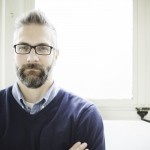 “When you actually encounter people of other faiths rather than talk about encountering people of other faiths, a lot of the usual debates begin to drop away. It’s easy to demonize other groups without actually encountering those groups. As soon as you start encountering them, the caricatures are shattered and we find they’re humans with the same sorts of issues as us. Often they have pertinent questions to ask us of our faith that challenge us—it’s not just a one way street. Far too often we are isolated in our religious silos, and it’s important to actually talk to people who hold these other views.”
“When you actually encounter people of other faiths rather than talk about encountering people of other faiths, a lot of the usual debates begin to drop away. It’s easy to demonize other groups without actually encountering those groups. As soon as you start encountering them, the caricatures are shattered and we find they’re humans with the same sorts of issues as us. Often they have pertinent questions to ask us of our faith that challenge us—it’s not just a one way street. Far too often we are isolated in our religious silos, and it’s important to actually talk to people who hold these other views.”
+ Oliver Crisp, professor of systematic theology, from “Islam: A Christian Perspective,” a series of short lectures created as a Fuller classroom experience for prospective students.
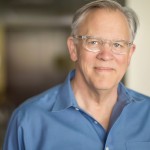 “One of the most profound marks of justice is the naming of the truth about the victim, the injustice, the perpetrator, the law, the consequences. Of course, discerning the right names about such things can be difficult. But more often the only real difficulty is the lack of will and resources to do so. Power is one the side of the misnamers. . . . Justice renames the forgotten as the remembered, the widow as the loved, and the oppressed as the treasured. Naming gives life misnaming has taken away. . . . When we truly name one another, we are reflecting the God we worship.”
“One of the most profound marks of justice is the naming of the truth about the victim, the injustice, the perpetrator, the law, the consequences. Of course, discerning the right names about such things can be difficult. But more often the only real difficulty is the lack of will and resources to do so. Power is one the side of the misnamers. . . . Justice renames the forgotten as the remembered, the widow as the loved, and the oppressed as the treasured. Naming gives life misnaming has taken away. . . . When we truly name one another, we are reflecting the God we worship.”
+ Mark Labberton, president of Fuller Theological Seminary, tracing the relationship between justice and language in his book The Dangerous Act of Loving Your Neighbor.
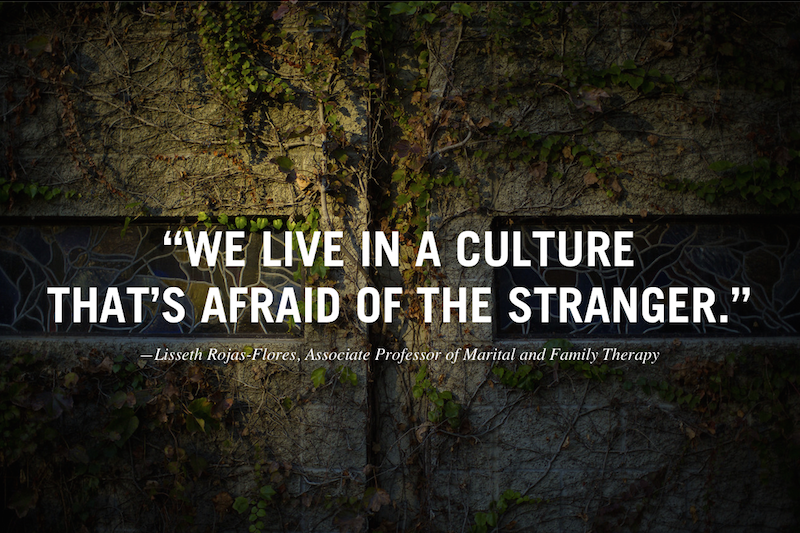
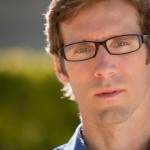 “The problem among the rulers of Jesus’ people is their tendency to maintain authority through token acts of justice and law observance which conceal the widespread injustice in which they are complicit, thus neglecting the justice of love that the Law enjoins. They are so addicted to those patterns of injustice and to the influence and resources they gain from them that they find themselves seeking to destroy the One who is exposing them—the One who is calling people with compelling power to obey the Torah by loving God and loving their neighbors. . . . This matter of token justice that sacrifices neighbors and others is a serious problem. It’s a serious problem for us.”
“The problem among the rulers of Jesus’ people is their tendency to maintain authority through token acts of justice and law observance which conceal the widespread injustice in which they are complicit, thus neglecting the justice of love that the Law enjoins. They are so addicted to those patterns of injustice and to the influence and resources they gain from them that they find themselves seeking to destroy the One who is exposing them—the One who is calling people with compelling power to obey the Torah by loving God and loving their neighbors. . . . This matter of token justice that sacrifices neighbors and others is a serious problem. It’s a serious problem for us.”
+ Tommy Givens, assistant professor of New Testament, preaching in All-Seminary chapel on the question, “Who is my neighbor?” He contrasted Christ’s teaching with a “malnourished moral consensus” that can perpetuate unaddressed economic injustice. Listen to his whole sermon here.
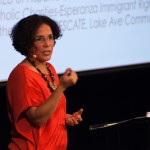 “We have a mandate to love God and to love our neighbor and care for the stranger. I think we have to continue reminding the church and educating the church through intercessory prayer and Christian activism and a lot of patience. We live in a culture that’s afraid of the stranger, and we live in a time right now where it’s ‘us versus them.’ It is at this moment that the church has to bear witness to who we are and how we’re different from the rest of the world in how we see the least of these and the marginalized.”
“We have a mandate to love God and to love our neighbor and care for the stranger. I think we have to continue reminding the church and educating the church through intercessory prayer and Christian activism and a lot of patience. We live in a culture that’s afraid of the stranger, and we live in a time right now where it’s ‘us versus them.’ It is at this moment that the church has to bear witness to who we are and how we’re different from the rest of the world in how we see the least of these and the marginalized.”
+ Lisseth Rojas-Flores, Associate Professor of Clinical Psychology, Department of Doctoral Psychology, applying her research on trauma to the recent refugee crises around the world at “Islam: A Christian Perspective,” a series of short lectures created as a Fuller classroom experience for prospective students.
 “One of the American myths is that we’re all individuals and we all make it on our own, and that’s why it’s so hard to even have a conversation on privilege because we can’t even acknowledge that as a group, as a socioeconomic class, as people that have certain common characteristics, some benefit and some do not. . . . I want us to think about privilege as the thing that we have but don’t think about and a thing that frames reality.”
“One of the American myths is that we’re all individuals and we all make it on our own, and that’s why it’s so hard to even have a conversation on privilege because we can’t even acknowledge that as a group, as a socioeconomic class, as people that have certain common characteristics, some benefit and some do not. . . . I want us to think about privilege as the thing that we have but don’t think about and a thing that frames reality.”
+ Juan Martínez, vice president for diversity and international ministries, reflecting on systemic privilege from “Living With Unjust Legacies: Race, Justice, and Privilege”
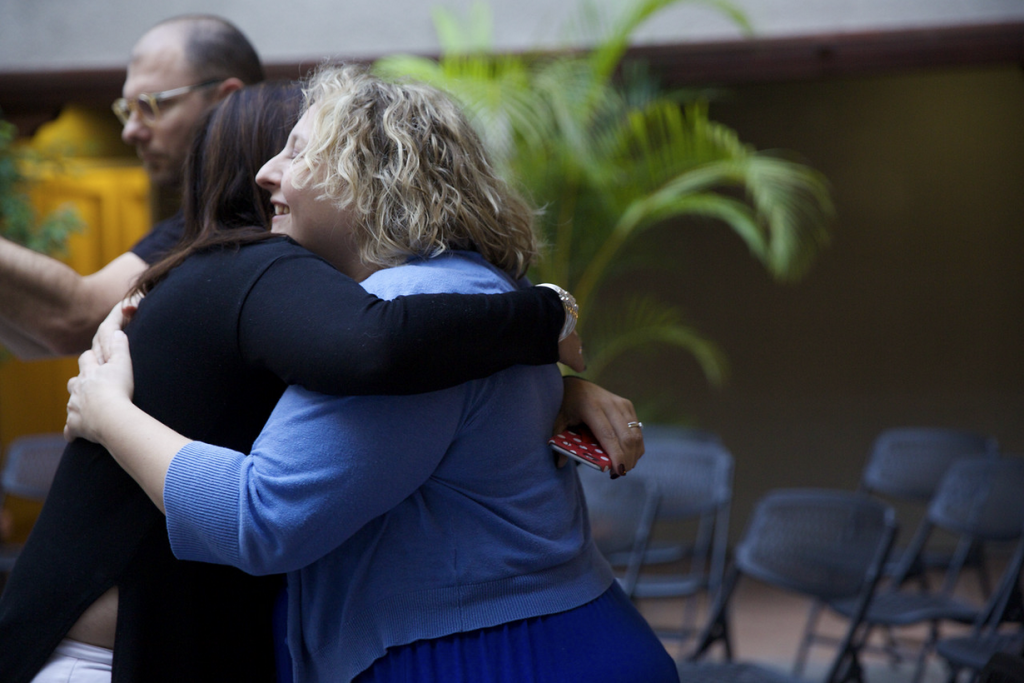
“Sitting at the feet of others outside our own context and finding out how they engage issues like racism or income inequality or refugees is truly transformational. It takes courage to step out in faith to build new kinds of relationships with our neighbors, but it always broadens our vision.”
+ Jennifer Ackerman, director for Micah Groups. Micah Groups, an initiative through the Brehm Center’s Ogilvie Institute of Preaching, are ethnically diverse communities that foster courageous conversations about engaging worship, preaching, and justice.
“He has told you, O mortal, what is good; and what does the LORD require of you but to do justice, and to love kindness, and to walk humbly with your God?”
—Micah 6:8
“In the denomination I’m part of, I sometimes feel separated from the larger body of Christ. We miss that beauty in diversity. Being in a community like Micah Groups help us connect across denominational, gender, and racial lines. So we really do have a sense of togetherness. And even when we argue, it’s a family argument—we still love each other because we’re brothers and sisters.”—Jason Thomas, New Orleans, LA
“They’ll know we are Christians by our love, as the old song goes. I work in a very homogenous, white, upper-middle-class context, so being in dialogue with people from different backgrounds is a witness to both my congregation and our surrounding community.”—Kate Spelman, Chicago, IL
“Sometimes you need these outside voices, having this broader view of your own reality that you get mired in every day, and they really bring a word of wisdom— whether as an individual or as a community speaking into my life as a pastor.”—Tim Yee, Los Angeles, CA
“When we come together with a posture of openness, we can learn to trust one another. We share not only our life stories, but also really difficult questions about justice or how we live or showing kindness to one another. These questions are fleshed out in real life as we continue to grapple with how to live out what we discuss.”—Bruce Main, Camden, NJ
+ Christ’s command to love our neighbor can seem ineffective in the face of the social issues of a globalized society, but together we can participate in Christ’s body both through and beyond our local contexts. The people quoted above love their neighbors through Micah Groups, an initiative of the Ogilvie Institute of Preaching. These ethnically and denominationally diverse communities of 10–12 ministry leaders meet regularly to be formed together into the neighborly love envisioned in Micah 6:8. Learn more here.
Further Reading
The Dangerous Act of Loving Your Neighbor: Seeing Others Through the Eyes of Jesus
Mark Labberton (IVP Press, 2010)
The Great World House: Martin Luther King, Jr. and Global Ethics
Hak Joon Lee (Pilgrim Press 2011)
Mere Morality: What God Expects From Ordinary People
Lewis Smedes (Eerdmans, 1989)
Just Peacemaking: Transforming Initiatives for Justice and Peace
Glen Stassen (John Knox Press, 1992)
America’s Original Sin: Racism, White Privilege, and the Bridge to a New America
Jim Wallis (Brazos Press, 2016)
Resources for Peacemaking in Muslim-Christian Relations: Contributions from the Conflict Transformation Project
J. Dudley Woodberry and Robin Basselin, eds. (Fuller Seminary Press 2006)
Available Classes
Advocacy for Social Justice with Karin Finkler
Music, Peacebuilding, and Interfaith Dialogue with Roberta King
Evangelism, Justice, and Emerging Generations with Chap Clark
Human Rights and the Old Testament with Kyong-Jin Lee
Christian Ethics with Hak Joon Lee
Christian Engagement with People Other Faiths with Diane Obenchain
+ This content is curated from ongoing conversations taking place throughout the Fuller community.

